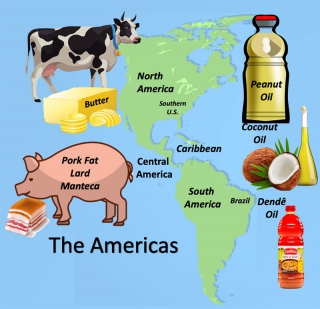
Go Authentic by Cooking with Indigenous Fats and Oils
29 March 2019Recreating global cuisines will be more authentic by using fats and oils native to the traditional preparations.
By John Reiss CEC, CCE, Milwaukee Area Technical College chef instructor and manager of TheCulinaryPro.com
World cuisines are defined by their use of indigenous ingredients, spice and herb combinations, and native cooking techniques. The fats or oils used when preparing different cuisines matters too. You will often hear the flavor is in the fat, and that is why it makes sense to start your cooking foundation using a particular type of fat. For example, butter in French cooking or olive oil in a Mediterranean dish.
Animal Fats
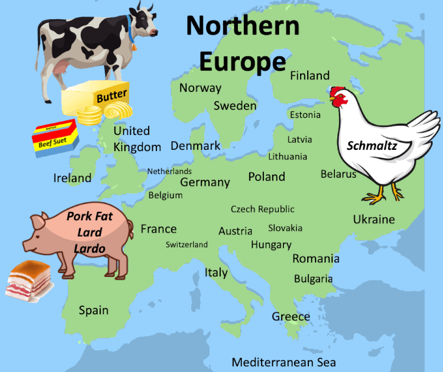
Butter, lard, suet and schmaltz are traditional fats in Europe
While cooking today often relies on refined vegetable oils like soy or canola, animal fats have been a common staple for hundreds of years. Butter is of course used in Northern Europe and North America. Ghee, clarified butter, is used in Indian cuisine. Schmaltz, rendered fat from chicken or geese, is a tradition in Eastern European Jewish Ashkenazi, Polish, and Ukrainian cooking. In Southwest France, rendered goose and duck fat is used for the preparation of confit, salted and cured poultry cooked slowly while submerged in the rendered fat. Confit is also a preservation technique because when food is cooled in the fat it can last for months.
Pork fat used across the globe
By far pork fat and lard are the king of fats used in cuisines from China and Thailand, to Nordic countries, to Spain (Manteca) and Italy (Lardo) in Southern Europe, and from the southern United States to Mexico and South America. Suet, made from rendered kidney fat of beef or mutton, is a tradition in English and Irish cuisines, for steak and kidney pudding and Irish stew among other preparations.
Olive Oil
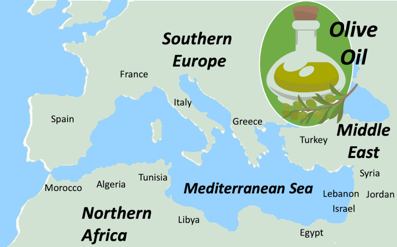
Olive oil is used predominately in Mediterranean cuisine
When it comes to vegetable oils, olive oil is central to Mediterranean cuisines from Southern Europe including Spain & Portugal to the French Riviera, Italy, and Greece. Middle Eastern cuisines along the Mediterranean, including Turkey, Syria, Jordan, Lebanon, Israel, as do Northern African cooking from Morocco to Egypt also rely on it.
Peanut, Coconut and Sesame Oils
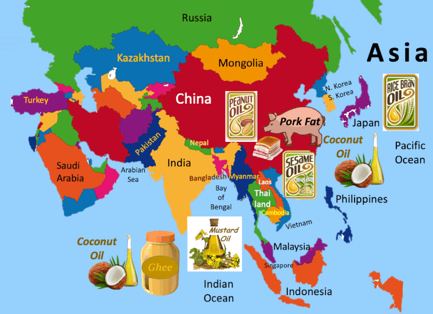
Pork fat, coconut, and sesame oil are used in Asian cuisine
Chinese cooking incorporates peanut and sesame oils, while coconut oil is used in Southeast Asian cuisines of Thailand and Vietnam. Coconut oil can also be found in Southern Asian countries including India, Pakistan, and Bangladesh, along with the characteristically pungent mustard oil. Coconut oil can be found in Caribbean cooking too. In Japan rice bran oil is favored for its light, neutral flavor.
Dendê oil, from the palm fruit, used in West African dishes
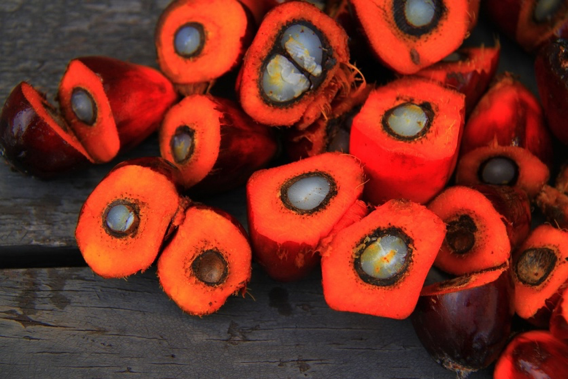
Palm fruit used for dendê oil common in West Africa and Brazil

Olive oil (North Africa), dendê oil (West Africa) and peanut oil are cooking oils of Africa
Red palm fruit oil, also known as Dendê oil (not to be confused with the highly refined palm kernel oil from the seeds of the tree), is a reddish-orange oil extracted from palm fruit trees and is an essential ingredient in Western African and Brazilian (especially Bahian) cuisine. Peanut oil, indigenous to South Africa, is common in Africa too.
Vegetable, seed, nut and fruit oils
Today in cooking across the globe highly refined vegetable oils, oils derived from seeds, nuts, fruits, and vegetables have supplanted other fats and oils because of their cheaper cost and stable shelf-life.
These include palm kernel, soy, rapeseed, and canola (a rapeseed cultivar), are cheaper in cost and have a stable shelf-life. Their neutral taste makes them adaptable to almost any cooking style plus they’re considered healthier than animal fats. While these are versatile, go-to oils for many preparations, recreating global cuisines will be more authentic by using those that are native to their traditional preparations.
